

Climate change: Greenland's ice faces melting 'death sentence' Greenland's massive ice sheet may have melted by a record amount this year, scientists have warned.
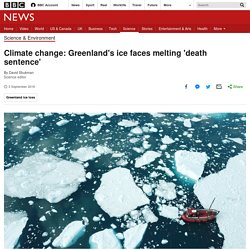
During this year alone, it lost enough ice to raise the average global sea level by more than a millimetre. Researchers say they're "astounded" by the acceleration in melting and fear for the future of cities on coasts around the world. One glacier in southern Greenland has thinned by as much as 100 metres since I last filmed on it back in 2004. Interactive Qaleraliq glacier, southern Greenland Why does Greenland matter? Essentially because its ice sheet is seven times the area of the UK and up to 2-3km thick in places. No one is suggesting that could happen for hundreds or even thousands of years but even a small increase in the rate of melting in coming decades could threaten millions of people living in low-lying areas.
Bangladesh, Florida, and eastern England are among many areas known to be particularly vulnerable to rises in sea level over the course of the century. Can anything be done? UN treaty would protect high seas from over exploitation. Image copyright Jeremy Bishop The first significant steps towards legally protecting the high seas are to take place at the UN in New York.
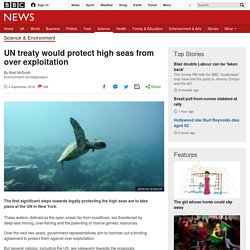
These waters, defined as the open ocean far from coastlines, are threatened by deep-sea mining, over-fishing and the patenting of marine genetic resources. Over the next two years, government representatives aim to hammer out a binding agreement to protect them against over-exploitation. Plastic fibres found in tap water around the world, study reveals. Microplastic contamination has been found in tap water in countries around the world, leading to calls from scientists for urgent research on the implications for health.
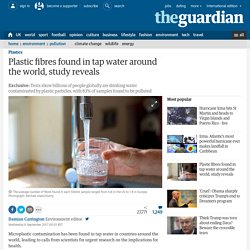
Scores of tap water samples from more than a dozen nations were analysed by scientists for an investigation by Orb Media, who shared the findings with the Guardian. Sea level fears as Greenland darkens. Image copyright Kate Stephens Scientists are "very worried" that the melting of the Greenland ice sheet could accelerate and raise sea levels more than expected.
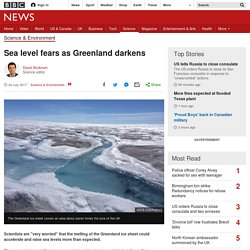
They say warmer conditions are encouraging algae to grow and darken the surface. Dark ice absorbs more solar radiation than clean white ice so warms up and melts more rapidly. 'Make new rules' to save the oceans. Second lowest minimum for Arctic ice. Image copyright PETER J.
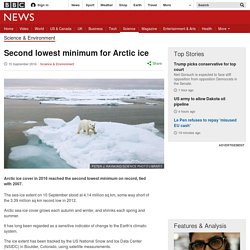
RAYMOND/SCIENCE PHOTO LIBRARY Arctic ice cover in 2016 reached the second lowest minimum on record, tied with 2007. The sea-ice extent on 10 September stood at 4.14 million sq km, some way short of the 3.39 million sq km record low in 2012. Arctic sea-ice cover grows each autumn and winter, and shrinks each spring and summer. It has long been regarded as a sensitive indicator of change to the Earth's climatic system. MPs call for ban on plastic microbeads. Image copyright SCIENCE PHOTO LIBRARY A worldwide ban on plastic microbeads in cosmetics should be imposed as soon as possible, MPs have demanded.

The Environmental Audit Committee says the tiny balls of plastic used in shower gels and facial scrubs can even be found in Arctic sea-ice and on the ocean floor. The MPs say synthetic fibres from worn car tyres and fleece jackets may also be harming wildlife. The Dutch boy mopping up a sea of plastic. 'Widespread methane leakage' from ocean floor off US coast.
Global warming slowdown 'could last another decade' 21 August 2014Last updated at 14:45 ET.
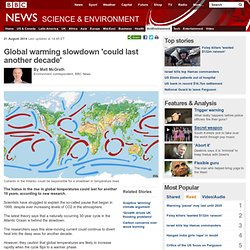
Expansion of US marine protected zone could double world reserves. 17 June 2014Last updated at 18:08 ET By Matt McGrath Environment correspondent, BBC News.
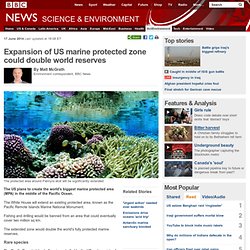
Can The Great Pacific Garbage Patch Clean Itself? Boat's voyage a shining example of solar potential. 5 September 2013Last updated at 19:07 ET By Richard Anderson Business reporter, BBC News The captain of the world's biggest solar-powered boat explains the challenges of navigating to catch the sun How do you propel 100 tonnes of metal around the world's oceans without fuel or even a sail?

For a pioneering group of Swiss investors and German engineers, the answer is simple - the sun. Add some design expertise from New Zealand and you have the MS Turanor PlanetSolar, the world's largest solar-powered boat and a striking glimpse into the future of marine travel. "The idea was to demonstrate the enormous potential of solar power by circumnavigating the globe," says Rachel Bros de Puechredon from PlanetSolar.
And with 60,000km (37,000 miles) successfully navigated, the team have achieved precisely that. Maximum exposure The Turanor uses energy harnessed from more than 500 sq m of solar panels to drive two, 60kW electric engines, each in turn driving a standard propeller. Unique opportunity. Aral Sea Moynaq Uzbekistan - Environmental Disaster. When it comes to man-made disasters it’s still hard to top the Aral Sea disaster (for now).

Created by the Soviets to turn their annexed territories (the Stans of Central Asia) into productive cotton growing regions. And it worked. Ships stranded on sand at Aral Sea, Moynaq, Uzbekistan. Europe fish stocks 'heading for recovery', study claims. 18 July 2013Last updated at 14:29 ET By Paul Rincon Science editor, BBC News website Cod remains vulnerable, but the authors say other stocks show signs of bouncing back Many European fish stocks are on the road to recovery from overfishing, according to a major new study. Findings from an international effort to assess the status of dozens of fish stocks are published in the journal Current Biology.
The research found that many stocks in the northeast Atlantic were being fished sustainably and, given time, should recover. But one researcher said that any talk of a recovery would be "premature". Study finds shipwrecks threaten precious seas. 7 June 2013Last updated at 09:39 ET By Matt McGrath Environment correspondent, BBC News. GM salmon can breed with wild fish and pass on genes. The potential risks of genetically modified fish escaping into the wild have been highlighted in a new study.
Scientists from Canada have found that transgenic Atlantic salmon can cross-breed with a closely related species - the brown trout. The fish, which have been engineered with extra genes to make them grow more quickly, pass on this trait to the hybrid offspring. UK claims breakthrough in fish dumping talks. The UK says it has agreed new laws with the European Union over the controversial dumping of unwanted fish. Fisheries minister Richard Benyon said the "reforms" would make discards "a thing of the past". But green groups were less upbeat, saying the European Parliament's plans on fishing reform were more ambitious.
After marathon talks, EU fisheries ministers agreed on a reform package including a ban on dumping pelagic fish, such as mackerel and herring. Sea urchin nickel 'trick' could be key to capturing carbon. 4 February 2013Last updated at 21:57 ET By Matt McGrath Environment correspondent, BBC News A close up of the skeleton of a sea urchin which could help capture and store carbon Researchers say that the natural ability of sea urchins to absorb CO2 could be a model for an effective carbon capture and storage system. Newcastle University scientists discovered by chance that urchins use the metal nickel to turn carbon dioxide into shell. Plastic-Eating Drone Could Swallow Pacific Garbage. Melt may explain Antarctica's sea ice expansion. 1 April 2013Last updated at 06:12 ET. Arctic Ocean 'acidifying rapidly' The Arctic seas are being made rapidly more acidic by carbon dioxide emissions, according to a new report. Scientists from the Arctic Monitoring and Assessment Programme (AMAP) monitored widespread changes in ocean chemistry in the region.
They say even if CO2 emissions stopped now, it would take tens of thousands of years for Arctic Ocean chemistry to revert to pre-industrial levels. Many creatures, including commercially valuable fish, could be affected.